Prime Minister of Portugal
| Prime Minister of the Portuguese Republic Primeiro-Ministro da República Portuguesa | |
|---|---|
|
| |
|
| |
| Style | His/Her Excellency[1] |
| Type | Executive |
| Member of |
Council of State Council of Ministers European Council |
| Residence | São Bento Palace |
| Seat | Lisbon, Portugal |
| Appointer | President of Portugal |
| Term length |
Four years (Parliament can be dissolved sooner); No term limits. |
| Constituting instrument |
Constitution of the Third Republic |
| Inaugural holder | Pedro de Sousa Holstein, Marquess of Palmela |
| Formation | 24 September 1834 |
| Salary |
€70,023.52 (2015) (€5,001.68/month)[2] |
| Website |
portugal |
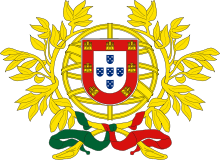 |
| This article is part of a series on the politics and government of Portugal |
| Constitution |
|
Legislature |
| Foreign relations |
Prime Minister (Portuguese: Primeiro-Ministro; pronounced: [pɾiˈmejɾu miˈniʃtɾu]) is the current title of the head of government of Portugal. As head of government, the Prime Minister coordinates the actions of ministers, represents the Government of Portugal to the other bodies of state, is accountable to Parliament and keeps the President informed. The Prime Minister can hold the role of head of government with the portfolio of one or more ministries.
There is no limit to the number of terms a person can serve as Prime Minister. The Prime Minister is appointed by the President of the Republic following legislative elections, after having heard the parties represented in the Parliament. Usually, the person named is the leader of the largest party in the previous election.
History
Since the Middle Ages, some officers of the Portuguese Crown gained precedence over the others, serving as a kind of prime ministers. Over time, the role of principal officer of the Crown fell upon the chanceler-mor (chancellor), the mordomo-mor (mayor of the palace) and the escrivão da puridade (king's private secretary).
The first modern prime minister of Portugal was Pedro de Sousa Holstein, Marquess of Palmela, who was sworn in on 24 September 1834, as Presidente do Conselho de Ministros (President of the Council of Ministers). In 1911, the official title of the prime minister became Presidente do Ministério (President of the Ministry). In 1933, it became again Presidente do Conselho de Ministros.
The present tile Primeiro-Ministro (Prime Minister), attributed to the head of the Government of Portugal, was officially established by the Constitution of 1976 after the revolution of 25 April 1974
Office Holders
The incumbent Prime Minister of Portugal is António Costa, who took office on 26 November 2015 as the 13th Prime Minister of the Third Portuguese Republic.[3] The official residence of the Prime Minister is a mansion next to São Bento Palace, which, in confusion, is also often called "São Bento Palace".
Portuguese Prime Ministers:
- 1st Mario Soares (two terms);
- 2nd Alfredo Nobre da Costa;
- 3rd Carlos Mota Pinto;
- 4th Maria de Lourdes Pintasilgo;
- 5th Francisco Sá Carneiro;
- (interim) Diogo Freitas do Amaral – Deputy Prime Minister;
- 6th Francisco Pinto Balsemão;
- 1st Mario Soares (third term);
- 7th Aníbal Cavaco Silva (three terms);
- 8th António Guterres (two terms);
- 9th José Manuel Barroso;
- 10th Santana Lopes;
- 11th José Sócrates (two terms);
- 12th Passos Coelho (two terms);
- 13th António Costa
Graphical timeline (since 1974)

Prime Minister's Residence
Just behind the main building of the Assembly of the Republic, there is a mansion that serves as residence and office for the Prime Minister of Portugal. The mansion, dated from 1877, was built within the garden of the old monastery that held the Portuguese Parliament. It has been the Prime Minister's official residence since 1938, when Salazar moved in. Although it is the official residence of the Prime Minister, not all incumbents have lived in the mansion during their term in office.
Living former Prime Ministers
There are nine living former Portuguese Prime Ministers:
- Living former Prime Ministers
.jpeg)
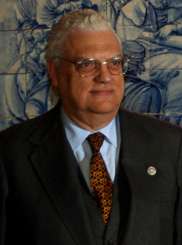

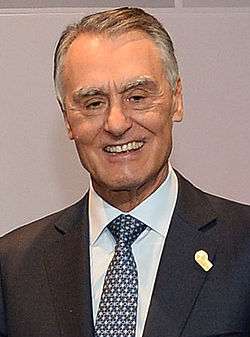
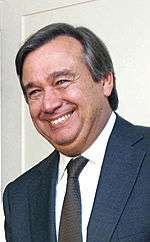
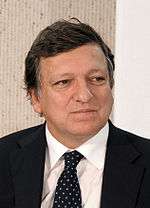

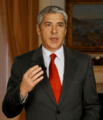

See also
References
- ↑ United Nations Protocol and Liaison Service Public List: Heads of State – Heads of Government – Ministers For Foreign Affairs. Retrieved 14 October 2016.
- ↑ Miguel Santos (23 September 2015). "E agora um tema sensível: os políticos são mal pagos?". Observador (in Portuguese). Lisbon. Retrieved 12 October 2016.
O mesmo se aplica ao primeiro-ministro: este ano, Pedro Passos Coelho recebe um salário mensal de 5.001,68 euros brutos, menos 12% do que recebia em 2010, antes dos cortes.
- ↑ "Portugal Socialist Costa named PM in left-wing coalition". BBC News. 24 November 2015. Retrieved 25 November 2015.

.jpg)